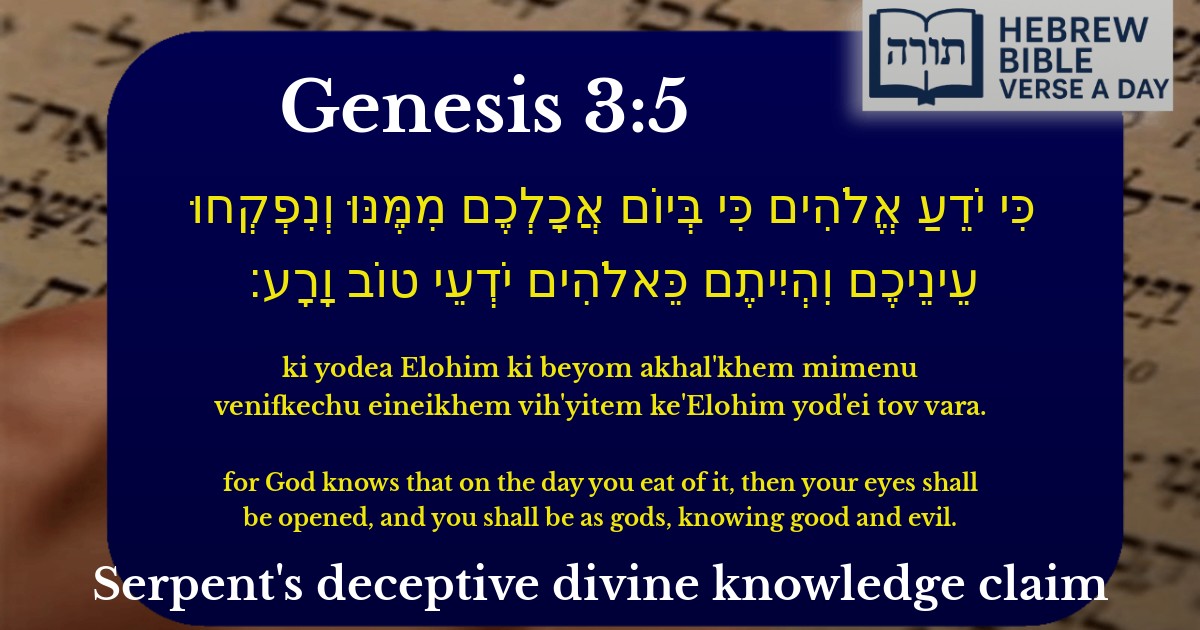Join Our Newsletter To Be Informed When New Videos Are Posted
Join the thousands of fellow Studends who rely on our videos to learn how to read the bible in Hebrew for free!
Hebrew Text
כִּי יֹדֵעַ אֱלֹהִים כִּי בְּיוֹם אֲכָלְכֶם מִמֶּנּוּ וְנִפְקְחוּ עֵינֵיכֶם וִהְיִיתֶם כֵּאלֹהִים יֹדְעֵי טוֹב וָרָע׃
English Translation
for God knows that on the day you eat of it, then your eyes shall be opened, and you shall be as gods, knowing good and evil.
Transliteration
Ki yodea Elohim ki beyom akhal'khem mimenu venifkechu eineikhem vih'yitem ke'Elohim yod'ei tov vara.
Hebrew Leining Text
כִּ֚י יֹדֵ֣עַ אֱלֹהִ֔ים כִּ֗י בְּיוֹם֙ אֲכׇלְכֶ֣ם מִמֶּ֔נּוּ וְנִפְקְח֖וּ עֵֽינֵיכֶ֑ם וִהְיִיתֶם֙ כֵּֽאלֹהִ֔ים יֹדְעֵ֖י ט֥וֹב וָרָֽע׃
כִּ֚י יֹדֵ֣עַ אֱלֹהִ֔ים כִּ֗י בְּיוֹם֙ אֲכׇלְכֶ֣ם מִמֶּ֔נּוּ וְנִפְקְח֖וּ עֵֽינֵיכֶ֑ם וִהְיִיתֶם֙ כֵּֽאלֹהִ֔ים יֹדְעֵ֖י ט֥וֹב וָרָֽע׃
🎵 Listen to leining
Parasha Commentary
📚 Talmud Citations
This verse is quoted in the Talmud.
📖 Sanhedrin 29a
The verse is referenced in a discussion about the nature of the serpent's temptation and the consequences of eating from the Tree of Knowledge.
📖 Sotah 9b
The verse is mentioned in the context of discussing the consequences of human actions and the acquisition of knowledge.


Understanding the Serpent's Argument
The verse (Bereshit 3:5) records the serpent's words to Chava (Eve), claiming that eating from the Tree of Knowledge would make Adam and Chava "like gods, knowing good and evil." Rashi explains that the serpent was suggesting that God was envious of humanity, fearing they would become His equals in wisdom. This reflects the yetzer hara's (evil inclination) tactic of portraying mitzvot as restrictive rather than protective.
The Nature of "Knowing Good and Evil"
Rambam (Moreh Nevuchim 1:2) interprets "knowing good and evil" as referring to moral autonomy—the ability to choose between right and wrong based on human reasoning rather than divine command. Before eating from the tree, humans instinctively followed truth (emet) and falsehood (sheker) as objective realities. Afterward, they gained the subjective capacity to define good and evil, which introduced moral complexity.
Midrashic Perspectives
Theological Implications
The Maharal (Gur Aryeh) emphasizes that the serpent's promise was inherently flawed: to "be like gods" suggests independence from the Creator, which is impossible for created beings. The verse thus underscores the fundamental Jewish principle that true wisdom comes from submission to Divine authority (Mishlei 1:7), not from seeking to transcend it.
Practical Lessons